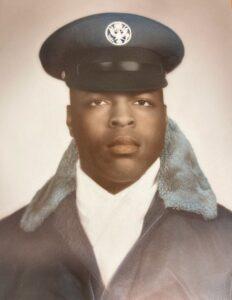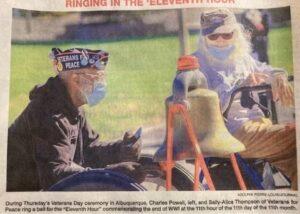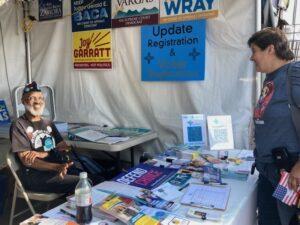USAF Vet Champions Peace and Social Justice
USAF E4 Charles Powell (Electrical Power Production Specialist) started out wanting to pursue a technical career, but a series of experiences led him to a life of helping people and fighting for the underdog. The world is a better place because of him! The causes of this active, card-carrying adherent to Democratic principles are varied. They range from fighting racial discrimination and protesting the US presence in the Vietnam War in the 1960’s, to supporting a woman’s right to choose, union workers, and anti-war causes that span generations.
The native of Jackson, MS, spent most of his youth in Chicago. “I loved science and math,” he said. “And I was good at it.”
“I’ve come to terms with realizing that I may have suffered racial discrimination when I was in school. Even though I had top grades in math and science, and I wanted to go to a technical high school, my counselor convinced me to attend a general high school; then she enrolled me in wood shop. As a senior in 1961, I learned that I was two math classes short for admission to the Illinois Institute of Technology, my college of choice. I could have taken the two courses during the summer but I joined the military instead,” he said.

Having other people making decisions that affected his destiny continued in the military (to no one’s surprise). He wanted to join the Army because they would give him his requested training, but his class of choice was full. So then he joined the Air Force. They first assigned him to electrician school; eventually he was trained in electrical power production, which led to him graduating at the top of his class and getting assigned to the Strategic Air Command at Ellsworth AFB in South Dakota. Then he was further trained and assigned to a Titan Intercontinental Ballistic Missile launch crew.
While in South Dakota, he experienced racial discrimination in subtle and not-so-subtle forms.
Charles recalls his first “cause”, near the end of his service (he was in the Air Force 1961-65, after training in Texas, serving in Rapid City, SD). This cause, identifying housing and public accommodation discrimination against African Americans in Rapid City, led Black Airmen to form a National Association for the Advancement of Colored People (NAACP) local chapter in 1963. It also led to the passage of a public accommodations (anti-discrimination) law in South Dakota, before the Federal Civil Rights Act was passed by Congress on July 2, 1964. “We testified about our discrimination tests to the state legislature. White airmen testified too. The evidence was undeniable,” the soft-spoken but direct veteran recalled. “The brass on the base didn’t like what we were doing. They didn’t like that we were badmouthing local citizens. Some airmen didn’t like what we were doing either.”
“I married my high school sweetheart in February of 1965 and was scheduled for discharge in October. We were soon expecting a child and planning to move back to Chicago. Our daughter was born three months early and two days after I left the Air Force. So we looked for housing and work in Rapid City. I was one of the few African Americans in my unit and one of the few in Rapid City. It was hard for any of us to find housing there. We ran into ‘veiled’ discrimination. When we found a place that was discriminating against blacks, we did a lot of ‘tests’. This was about housing and about public accommodation discrimination. When a person of color would get turned away, then a white airman would go in and get the apartment or get seated – it worked that way. We did it several times in each restaurant and repeatedly for housing,” Charles said.
He stayed in South Dakota for a few years, working and going to school. “I thought about going for my dream, going to technical school. I was taking part time courses – math and science. I took chemistry and almost failed it. I realized I was still thinking in ‘that old way’. And that I had changed. My skills and interests had changed,” he said. “I wanted to go in a new direction. So I got my BS in social sciences, from 1969-72, at Black Hills State in SD. I also worked during the summers.”
After he left the Air Force, he also worked at a variety of jobs until landing a position in the federal government. He first worked at a Job Corps Center for the US Forest Service. Then he transferred to another Job Corps center with the Bureau of Indian Affairs (BIA), on the Cheyenne River Reservation in South Dakota. The jobs were cancelled and the center closed because of budget cuts. “LBJ (Lyndon Baines Johnson, the president at the time) was trying to fight his war on poverty while also fighting the war on Vietnam,” Charles said. “When the BIA job was abolished, I was given priority on all BIA positions, for which I could qualify. I chose to be an Education Assistant at Intermountain Indian School in Brigham City, UT.”
“While living in Utah, we often shopped in Pocatello, ID. One day I happened upon an anti-war protest and for the first time joined in. I’ve been against war ever since, I guess,” he said. “I’ve been an active member of Veterans for Peace since 1987 or 88, here in New Mexico and nationally. I’ve expanded my protesting to include stopping nuclear proliferation. In fact, on October 14, Veterans for Peace here in New Mexico just participated in a nationwide protest at Congressional and Senate Offices. We want our Congress to speak out in favor of negotiation and peacemaking. We want President Biden to negotiate and seek peace.” The protests were called “Defuse Nuclear War”.

While discussing his strong anti-war feelings and actions, Charles thought back to his Air Force days supporting the Titan program. “You know, I never thought about what I would do if we had to launch a missile”, he said. “I was part of the launch crew. Back then, I reasoned that if we had to launch, I would follow orders. I never thought about disobeying. I knew, though, that I’d probably never see my family again if that happened,” he reflected. “But now, I’m thinking about that again. Would ‘the current Charles’ have followed orders back then? I really don’t know. But I might not have, if I knew then what I’ve learned over the decades since.”
Protesting the war wasn’t the only cause that deeply affected his life in Utah. “Not only was I against the war, but my wife and I were still fighting against racial discrimination. Only this time, we got arrested and charged and eventually convicted of disturbing an assembly,” he said.
“In 1968, we literally stood up for a fellow black person at a meeting who was not being allowed to ask his question of the presenter. Then the crowd turned against all three of us black persons. Turmoil rose up; the meeting organizer, which turned out to be a group akin to the John Birch Society, ended the meeting abruptly. Two days later, we got a court summons with the charges against us. With the help of the NAACP and ACLU in Ogden, we appealed to District Court and even the state Supreme Court. But in the end, the conviction stood. By the time it was all settled, we’d moved out of Utah,” he said.
Since then, Charles and his wife divorced and he eventually made his way to New Mexico. He’s lived in Los Lunas and has lived in Albuquerque for a long time. When I asked him if he is active in any other organizations, he flipped open his wallet and flashed about 15 current membership cards at me. It read like the Who’s Who of modern day causes. Along with our VMF caucus and Veterans for Peace, he is a member of several unions, Planned Parenthood, the NAACP and the Southern Christian Leadership Conference (SCLC), and NPR and PBS.

He is also a member of several writing groups, as his current avocation is writing stories based on his life. “I enjoy writing,” he said, smiling. “I’ve even written a series of articles about animal dissimilarities, based on the 10 years when I volunteered at the Rio Grande Zoo. I’m looking for a way to get them published.”
Reflecting back on where he thought he wanted his life to head, Charles is happy with the path he has taken. “I live what I believe. And I have two grandsons who are pursuing technical careers today. I feel they got some of that from me,” he said, smiling.